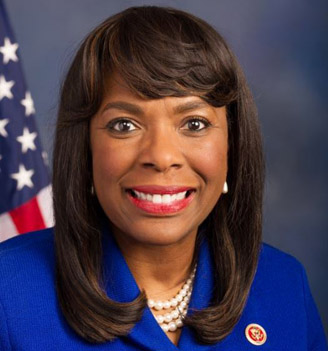By Brandon Moseley
Alabama Political Reporter
Friday, February 13, 2015, Congresswoman Terri Sewell (D-Selma) issued a written statement after the Voting Rights Amendment Act of 2015 was reintroduced in the U.S. House of Representatives. While supportive of the legislation’s intent, Congresswoman Sewell wants to see the legislation strengthened.
Congresswoman Sewell said, “I am pleased that both Democrats and Republicans recognize the need to strengthen Federal voter protections, however, I am deeply concerned that in its current form, the Voting Rights Amendment Act of 2015 would not cover the State of Alabama under the bill’s new Section 5 coverage formula.”
Rep. Sewell said, “The new formula omits key states, like Alabama, and does not take into account consent decrees. Alabama has a storied history of voter suppression. Although progress has been made, it is largely due to the protections granted by the landmark Voting Rights Act of 1965. We have witnessed a steady erosion of voter protections in the wake of Shelby County v. Holder that prove federal oversight is still necessary.”
The only Black Congresswoman in the history of Alabama said, “Last January, a federal judge reinstated federal oversight in the City of Evergreen, Alabama, using Section 3 of the Voting Rights Act which allows the courts to ‘bail in’ jurisdictions that have intentionally discriminated against minority voters. The City of Evergreen came under federal scrutiny for unfairly excluding African-Americans from the voting rolls, and for attempting to further dilute their voting power with a redistricting plan that would pack its majority black population into only two of five municipal districts.”
Rep. Sewell continued, “The State of Alabama has also enacted a proof-of-citizenship requirement and photo identification rules that makes it harder to vote. Imposing additional and unnecessary restrictions discourages young adults, the elderly, people of color, naturalized citizens, and low-income individuals from coming to the polls. We need to protect their voices, not silence them completely.”
The bill, H.R. 885, which was sponsored by Congressmen Jim Sensenbrenner (R-Wisconsin) and John Conyers (D-Michigan) was an attempt to pass voting rights legislation after the Supreme Court ruled last year that part of the Voting Rights Act of 1965 went too far and was struck down in the landmark “Shelby County vs. Holder” ruling.
Bill sponsor Congressman Sensenbrenner wrote in a statement, “The Voting Rights Act (VRA) is one of the most important pieces of civil rights legislation ever passed and is vital to our commitment to never again permit racial prejudices in our electoral process. It began a healing process that ameliorated decades of discrimination and helped distinguish a democracy that serves as an example for the world. Free, fair, and accessible elections are sacrosanct, and the right of every legal voter to cast their ballot must be unassailable. The VRA broke from past attempts to end voter discrimination by requiring federal preclearance of changes to voting laws in areas with documented histories of discrimination. There is no acceptable remedy for an unfair election after the fact. Section 5 of the VRA was the only federal remedy that could stop discriminatory practices before they affected elections.”
Rep. Sensenbrenner wrote, “Shelby County vs. Holder severely weakened the election protections that both parties have fought to maintain. The Court disregarded years of work by Congress. In a 5-4 decision, the Court eliminated the VRA’s formula for determining which areas are covered by section 5. The result is that the preclearance requirement remains, but it no longer applies anywhere except in the handful of locations currently subject to a court order. By striking down Section 4, the Court presented Congress with both a challenge and a historic opportunity. We are again called to restore the critical protections of the act by crafting a new formula that will cover jurisdictions with recent evidence of discrimination.”
Congressman Sensenbrenner concluded, “The Voting Rights Amendment Act is bipartisan, bicameral and compliant with the Supreme Court’s ruling. I reintroduced this important legislation because I believe voter discrimination still exists, and our progress toward equality should not be mistaken for a final victory. My colleagues on both sides of the aisle should work together to ensure Americans’ most sacred right is protected.”
Congresswoman Sewell concluded, “The struggle to ensure that all Americans can participate equally in the political process continues. Voting rights advocates and everyday citizens must remain vigilant and do all they can to safeguard against efforts to constrict democracy in state, local, and federal elections and beyond. Our democracy requires it. On the 50th anniversary celebration of the Voting Rights Act, and the historic march that led to its passage, I urge my colleagues to make a commitment to work together across the aisles and restore the Voting Rights Act for all Americans.”
In 1965, Alabama was one of several states ordered by the federal government to submit any redistricting plans to the US Department of Justice (DOJ) Civil Rights Division for preclearance. All redistricting plans had to be approved by the DOJ. The “Shelby County vs. Holder” decision which was originally brought by the city of Calera over what they felt struck down that section of the old VRA.
Many officials in Alabama feel that 1965 was 50 years ago. Most of the people who are alive today in Alabama were either children then or not yet born. They argue that times have changed and the time for excessive federal interference in Alabama’s governance is long over and oppose any new reimplementation of the cumbersome preclearance requirement. Others like Congresswoman Sewell think that some restoration of the controversial preclearance section of the old VRA is still necessary. It is difficult however to craft a bill that would pass both Houses of Congress, be acceptable to the Obama Administration, and comply with the “Shelby County versus Holder” ruling.
Congresswoman Terri Sewell represents Alabama’s Seventh Congressional District.






















































